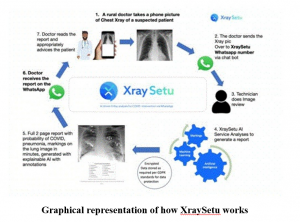AI-driven ‘XraySetu’ to Facilitate Early COVID Interventions
XraySetu, a new AI-driven platform has been developed that will help in early intervention over WhatsApp. This will be made possible through rapid screening of COVID-19 cases with the help of chest X-ray interpretation for doctors who have access to X-ray machines.
XraySetu can work with low resolution images sent via mobiles, it is quick and easy to use, and it can facilitate detection in rural areas.
As COVID-19 continues to wreak havoc across the rural heartlands of India, it has become critical to drive rapid testing, contact tracing, and create dedicated containment zones. When tests take more than a week in some cities, rural areas face even serious challenges.
ARTPARK (AI & Robotics Technology Park), a not-for-profit foundation established by the Indian Institute of Science (IISc), Bangalore, with support from the Department of Science & Technology (DST), Govt. of India, in collaboration with Bengaluru-based Health-Tech start-up, Niramai and the Indian Institute of Science (IISc) has developed XraySetu. It is specifically designed to identify COVID-positive patients even from low-resolution chest X-ray images sent over WhatsApp.
Also Read : 8th Global Nitrogen Conference Focuses on Sustainable Development Goals
It also has semantic annotations of affected areas for review and localized heatmap by doctors to help them verify it easily. It has already served close to over 1200 reports so far from the interior parts of the country.
To conduct the health check, a doctor simply needs to visit www.xraysetu.com and click on the ‘Try the Free XraySetu Beta’ button. The platform will then redirect the person to another page, wherein he or she can choose to engage with the WhatsApp-based chatbot via web or smartphone application.
The doctor can however simply send a WhatsApp message to the phone number +91 8046163838 to start the XraySetu service. Then they just need to click the picture of the patient’s X-ray and obtain the 2-page automated diagnostics with annotated images in a few minutes. While extending the probability of the COVID-19 contraction, the report also highlights a localized heatmap for a quick perusal of the doctor.
Tested and validated with over 1,25 000 X-ray images from National Institute of Health, UK as well as over 1000 Indian COVID patients, XraySetu has shown excellent performance with 98.86% sensitivity and 74.74%specificity.
Founder and CEO of ARTPARK Mr Umakant Soni said, “We need to scale technology for addressing the needs of 1.36 billion people, especially considering we have 1 radiologist for over 1 million people here. Built with the collaboration of industry and academia, XraySetu paves the way for exponential technologies like AI to leapfrog and provide cutting-edge healthcare technology to rural India in an extremely cost-effective manner.”
“NIRAMAI has partnered with ARTPARK and IISc to provide a rapid COVID screening method for rural doctors who have access to X-ray machines. XraySetu provides an automated interpretation of chest X-rays to predict if a patient has any lung abnormality that indicates COVID-19 infection,” said Dr Geetha Manjunath, Founder and CEO of Niramai.
“In the absence of COVID-positive X-ray images, we developed a unique Transfer Learning framework that leverages easily available X-ray images of lungs, not necessarily COVID positive, to learn useful features which have high predictive power. We also developed a confidence score which is guided by the areas of lungs that are infected. The system outputs a prediction, localizes the infected parts, and creates a report which gives a confidence score, all within a few minutes,” said Prof. Chiranjib Bhattacharyya, IISc.
Besides COVID-19, the platform can also detect 14 additional lung-related ailments, including tuberculosis and pneumonia. It can further be used for both analogue and digital X-rays and has been successfully piloted by more than 300 doctors in rural areas over the last 10 months.Technologies like XraySetu can enable cutting-edge AI-driven systems powering mobile primary health centres (PHCs), which can make healthcare more accessible even across rural India at a fraction of the cost. (India Science Wire)
